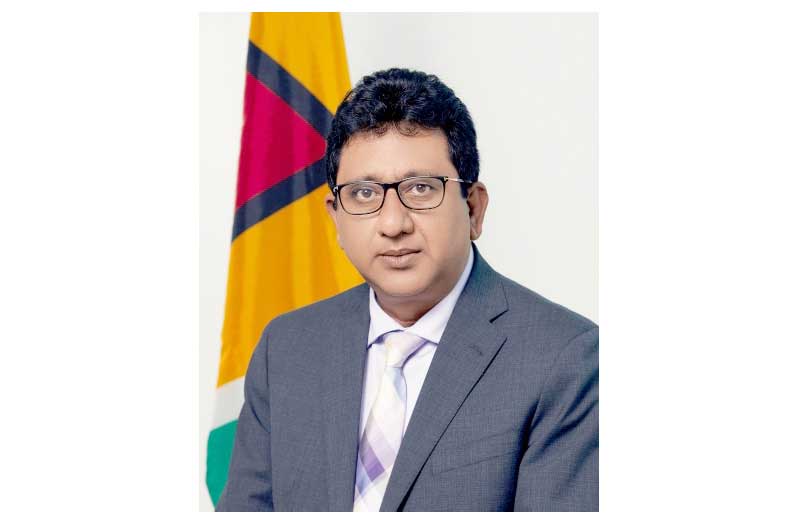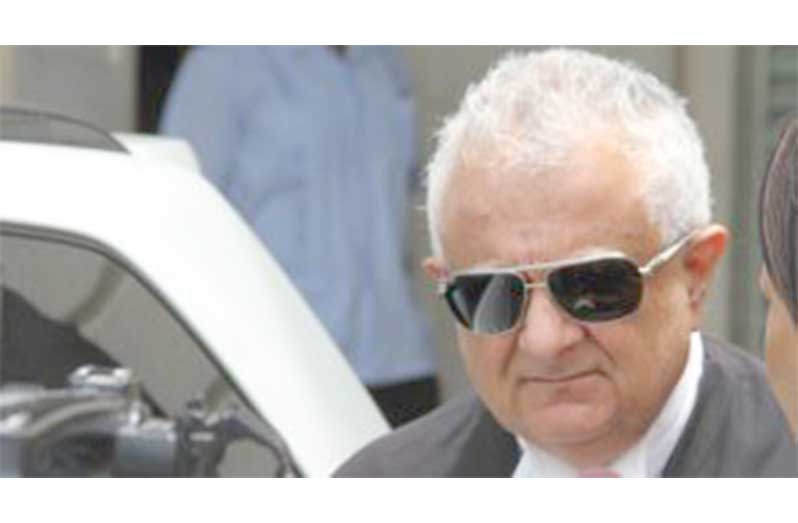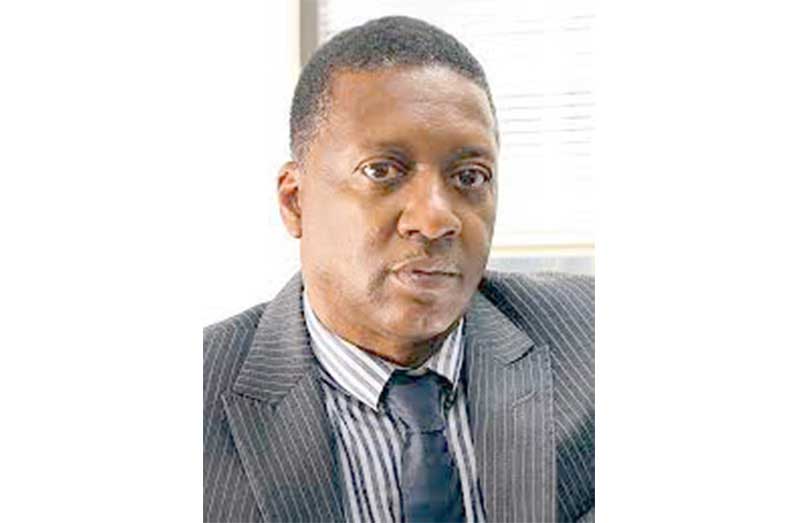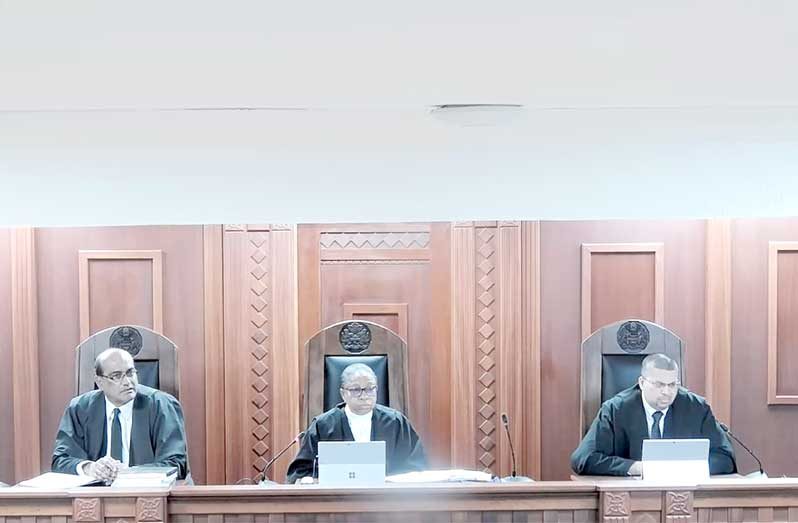GUYANA’S Court of Appeal is expected to make a summary ruling on an appeal filed by a candidate of the Forward Guyana Movement (FGM) following the hearing of submissions on Wednesday.
On Wednesday, the first appeal hearing was called before Chancellor of the Judiciary (ag) Roxanne George and Justices of Appeal, Nareshwar Harnanan and Rishi Persaud, during which submissions from parties were heard.

Attorney Dr Vivian Williams, representing the candidate Krystal Hadassah Fisher (the applicant), stated that as part of his submissions, they were to determine whether the matter concerns constitutional rights or falls within the exclusive jurisdiction of an election petition.
Williams argued that the Court of Appeal has jurisdiction, stating, “This is not an election petition matter… it involves constitutional rights, not election validity.
With this he contended that the high court’s decision wrongly diluted rights guaranteed under the constitution.
Further to this, he stated that the High Court’s reliance on the Representation of the People Act (ROPA) had the effect of unlawfully reshaping the right to vote.
Justice of Appeal George on this point questioned Williams, asking: “The Court held that ROPA modified the constitution?” to which he responded: “The court did not hold that ROPA modified the Constitution… but the effect of the decision… qualifies the right to vote, which in essence modifies it.”
Added to this, Justice George challenged that in the original case, the application gave the impression that the Guyana Elections Commission (GECOM) unilaterally excluded FGM and another party from the ballot.
“Clearly was the appellant not being frank with the court because when you read the fixed date application and the affidavit in support, it did not say that FGM and ALP were not contesting in the particular geographical constituencies. If one did not have the defence… the affidavit lent to the view that GECOM took a unilateral decision to exclude those two parties from being listed on the ballot, whereas it was that the parties chose not to contest in those two geographical constituencies,” Justice George said.
However, Williams said, “That’s the heart of our case… FGM did not make a choice not to have its presence on the ballot… they did not make that choice, that was done by GECOM’s exclusion.”
Justice George further questioned, “So you’re saying FGM did not choose not to contest… Did they present candidates for geographical constituency nine?”
Meanwhile, Attorney General Anil Nandlall, during his submissions, urged the Court of Appeal to strike out the appeal, arguing that the court lacks jurisdiction to hear the case outside the framework of an election petition.

“The matters raised in the appeal are substantially matters for an election court of which this Court is not,” Nandlall submitted. “They seek to challenge parts of the electoral process, and the high court and this Court, unless it sits in that special capacity, cannot deal with these matters, certainly not by fixed date application.”
Nandlall, relying on Section 140 of ROPA, noted that the law expressly bars ordinary courts from questioning the actions of GECOM and its members. “This section, your honour, immunises decisions of GECOM from challenge, GECOM or its members… other than through (Article) 163, the decisions of GECOM cannot be questioned and 163 was not invoked,” he said.
He went on to add that the appeal was wrongly framed as a constitutional rights issue, as it targeted GECOM’s conduct during the election period.
“The action was filed after the proclamation was issued declaring an election…. It happened actually within the electoral process itself as voting had already commenced… So clearly the election petition mechanism ought to have been invoked and the special jurisdiction of the court ought to have been invoked,” he added.
The Attorney General further dismissed the claim that FGM had been excluded by GECOM, “Suppose FGM did not even run in the elections, would GECOM be at fault? Should GECOM have included FGM in the ballot if it didn’t decide to contest the national election at all?”
Further to this, he said that perhaps there is a reason why the case was described as an extraordinary one without foundation, and as such stated that it should never have been filed.
Against this backdrop, he disclosed that the appellant could not show how ROPA was violated.
Making submissions on behalf of the Guyana Elections Commission (GECOM), Senior Counsel Anthony Astaphan said that FGM had no one but itself to blame for its exclusion from three constituencies as it failed to submit candidate lists as required by law.
The attorney pointed to specific sections of the Representation of the People Act, which notes that political parties are to express their intention to contest by submitting a list. Without such a list, he argued that GECOM could not lawfully include candidates’ names on the ballot.

Nobody is going to be denied the right to vote, because the electorate, the voters in that constituency, have the constitutional and statutory right to vote for any other list by any other party that has been put forward,” he said.
He further added that, “In our case, we have submitted that there are a number of… political parties that have submitted candidates for all ten constituencies.”
Turning to matters of jurisdiction, Astaphan also argued that the appellant directly targeted an ongoing election and therefore could only be pursued through an election petition.
Further to this, on the appellant’s claim of discrimination, Astaphan said, “I don’t know how that arises… because GECOM acted in accordance with the law, based on the lists submitted by political parties.”
Subsequently, it was stated that the court will make a summary decision today, with the fuller decision to be issued in due course.
Just a few days before the General population went to the polls and a few days after the joint services had cast their ballots, the High Court upheld GECOM’s decision to exclude the FGM from ballots in Regions Seven, Eight and Nine.
FGM had moved to the High Court, arguing that GECOM acted unfairly by omitting the party from those districts.
In his ruling, Chief Justice Navindra Singh dismissed the case, calling the party’s contentions “ludicrous.”
He emphasised that the law — the Constitution of Guyana and the Representation of the People Act (RoPA)— requires political parties to submit candidate lists for every district they wish to contest. FGM’s failure to provide lists for the three regions automatically disqualified it from appearing on the ballots there, the judge held.



.jpg)








